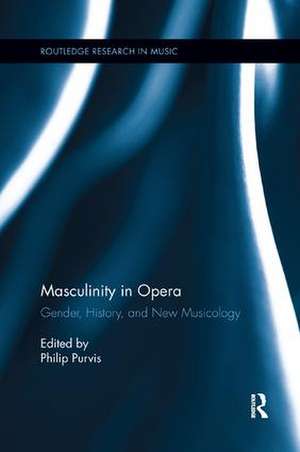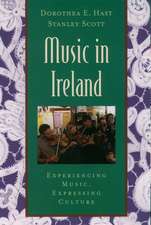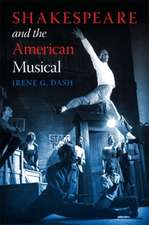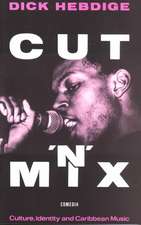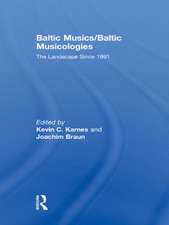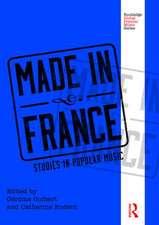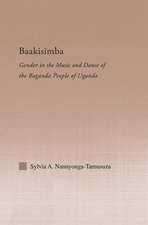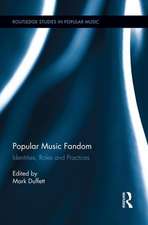Masculinity in Opera: Routledge Research in Music
Editat de Philip Purvisen Limba Engleză Paperback – 7 feb 2017
| Toate formatele și edițiile | Preț | Express |
|---|---|---|
| Paperback (1) | 489.26 lei 6-8 săpt. | |
| Taylor & Francis – 7 feb 2017 | 489.26 lei 6-8 săpt. | |
| Hardback (1) | 1111.51 lei 6-8 săpt. | |
| Taylor & Francis – 10 iun 2013 | 1111.51 lei 6-8 săpt. |
Din seria Routledge Research in Music
-
 Preț: 311.41 lei
Preț: 311.41 lei -
 Preț: 324.89 lei
Preț: 324.89 lei -
 Preț: 312.81 lei
Preț: 312.81 lei -
 Preț: 325.35 lei
Preț: 325.35 lei - 9%
 Preț: 935.56 lei
Preț: 935.56 lei -
 Preț: 312.28 lei
Preț: 312.28 lei -
 Preț: 290.00 lei
Preț: 290.00 lei -
 Preț: 389.38 lei
Preț: 389.38 lei - 19%
 Preț: 223.07 lei
Preț: 223.07 lei -
 Preț: 438.05 lei
Preț: 438.05 lei - 17%
 Preț: 256.32 lei
Preț: 256.32 lei -
 Preț: 466.45 lei
Preț: 466.45 lei - 18%
 Preț: 1000.45 lei
Preț: 1000.45 lei -
 Preț: 416.22 lei
Preț: 416.22 lei - 21%
 Preț: 257.49 lei
Preț: 257.49 lei - 18%
 Preț: 1000.27 lei
Preț: 1000.27 lei - 13%
 Preț: 310.55 lei
Preț: 310.55 lei -
 Preț: 324.74 lei
Preț: 324.74 lei - 18%
 Preț: 998.71 lei
Preț: 998.71 lei - 18%
 Preț: 894.39 lei
Preț: 894.39 lei -
 Preț: 311.41 lei
Preț: 311.41 lei - 18%
 Preț: 1000.27 lei
Preț: 1000.27 lei - 18%
 Preț: 1050.09 lei
Preț: 1050.09 lei -
 Preț: 437.71 lei
Preț: 437.71 lei - 18%
 Preț: 1119.87 lei
Preț: 1119.87 lei -
 Preț: 388.72 lei
Preț: 388.72 lei -
 Preț: 389.22 lei
Preț: 389.22 lei - 31%
 Preț: 765.03 lei
Preț: 765.03 lei -
 Preț: 420.08 lei
Preț: 420.08 lei - 18%
 Preț: 1003.99 lei
Preț: 1003.99 lei - 18%
 Preț: 1054.97 lei
Preț: 1054.97 lei -
 Preț: 391.14 lei
Preț: 391.14 lei - 18%
 Preț: 834.72 lei
Preț: 834.72 lei
Preț: 489.26 lei
Nou
Puncte Express: 734
Preț estimativ în valută:
93.62€ • 97.95$ • 77.77£
93.62€ • 97.95$ • 77.77£
Carte tipărită la comandă
Livrare economică 03-17 aprilie
Preluare comenzi: 021 569.72.76
Specificații
ISBN-13: 9781138709409
ISBN-10: 1138709409
Pagini: 266
Ilustrații: 14
Dimensiuni: 152 x 229 x 21 mm
Greutate: 0.45 kg
Ediția:1
Editura: Taylor & Francis
Colecția Routledge
Seria Routledge Research in Music
Locul publicării:Oxford, United Kingdom
ISBN-10: 1138709409
Pagini: 266
Ilustrații: 14
Dimensiuni: 152 x 229 x 21 mm
Greutate: 0.45 kg
Ediția:1
Editura: Taylor & Francis
Colecția Routledge
Seria Routledge Research in Music
Locul publicării:Oxford, United Kingdom
Public țintă
Postgraduate and UndergraduateCuprins
Introduction Philip Purvis 1. Performing Masculinity / Masculinity in Performance Kate Whittaker Part I : Voicing Masculinity 2. Soprano Masculinities Susan McClary 3. Pitch Fever: The Castrato, the Tenor, and the Question of Masculinity in Nineteenth Century Opera Freya Jarman 4. Russian Opera Rebels: Fyodor Komissarzhevsky, Nikolai Figner, and the Rise of the Tenor Antihero Juliet Forshaw 5. Enrico Caruso: Operatic-Phonographic Crooner Karen Henson 6. The Erotics of Masculinity in Zeffirelli’s Film Otello Marcia J. Citron Part II: Troubling Masculinity 7. Saint-Saëns’s Samson Kevin Kopelson 8. More Cases of Wagner Peter Franklin 9. Britten and the Deadlock of Identity Politics J.P.E. Harper-Scott 10. Troubling Gender and Identity in W.A. Mozart’s Zaide and Chaya Czernowin’s Adama Martin Iddon Part III: Troubled Masculinity 11. Opera’s Unconscious, or What Men Don’t Say Ian Biddle 12. Portrait of the Artist as an Older Man Linda and Michael Hutcheon 13. The ‘Crisis’ of Masculinity in Poulenc’s Les Mamelles de Tirésias Philip Purvis
Notă biografică
Philip Purvis teaches at d'Overbroeck's College, Oxford, UK.
Descriere
This book addresses the ways in which masculinity is negotiated, constructed, represented, and problematized within operatic music and practice. Although the consideration of masculine ontology and epistemology has pervaded cultural and sociological studies since the late 1980s, and masculinity has been the focus of recent if sporadic musicological discussion, the relationship between masculinity and opera has so far escaped detailed critical scrutiny. Operating from a position of sympathy with feminist and queer approaches and the phallocentric tendencies they identify, this study offers a unique perspective on the cultural relativism of opera by focusing on the male operatic subject. Anchored by musical analysis or close readings of musical discourse, the contributions take an interdisciplinary approach by also engaging with theatre, popular music, and cultural musicology scholarship. The various musical, theoretical, and socio-political trajectories of the essays are historically dispersed from seventeenth to twentieth- first-century operatic works and practices, visiting masculinity and the operatic voice, the complication or refusal of essentialist notions of masculinity, and the operatic representation of the ‘crisis’ of masculinity. This volume will not only enliven the study of masculinity in opera, but be an appealing contribution to music scholars interested in gender, history, and new musicology.
